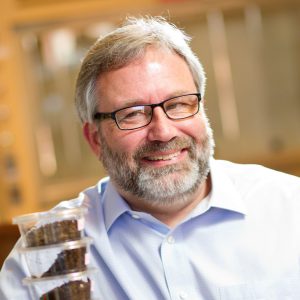Allen Moore
 Lamar Dodd Creative Research Award 2017
Lamar Dodd Creative Research Award 2017
Allen Moore, Distinguished Research Professor of Genetics, is an evolutionary behavior geneticist who conducts research on the genetics of sociality using insects, which have often played key roles in elucidating the evolution of social behavior. His work combines theoretical and statistical approaches to tackle evolutionarily important problems in behavior, and then brings the full arsenal of modern molecular techniques to dissect the underlying mechanisms. Moore has selected his insect systems in a way that allows him to manipulate experimentally varied social behaviors, including aggression, mating, altruism, and notably, parental care. In his latest advance, Moore uses genomic approaches to understand complex behavioral traits in burying beetles. His work will test the importance of specific genes in determining differences between care provided by mothers and fathers, and between single parents and biparental teams. It may open the doors to understanding pathways of gene interaction both within parents and between parents and offspring.
Previous Award
- Distinguished Research Professor 2014

 Distinguished Research Professor 2014
Distinguished Research Professor 2014 Distinguished Research Professor 2014
Distinguished Research Professor 2014 Distinguished Research Professor 2014
Distinguished Research Professor 2014 Distinguished Research Professor 2013
Distinguished Research Professor 2013 Distinguished Research Professor 2013
Distinguished Research Professor 2013 Distinguished Research Professor 2013
Distinguished Research Professor 2013 Distinguished Research Professor 2012
Distinguished Research Professor 2012 Distinguished Research Professor 2012
Distinguished Research Professor 2012 Distinguished Research Professor 2012
Distinguished Research Professor 2012